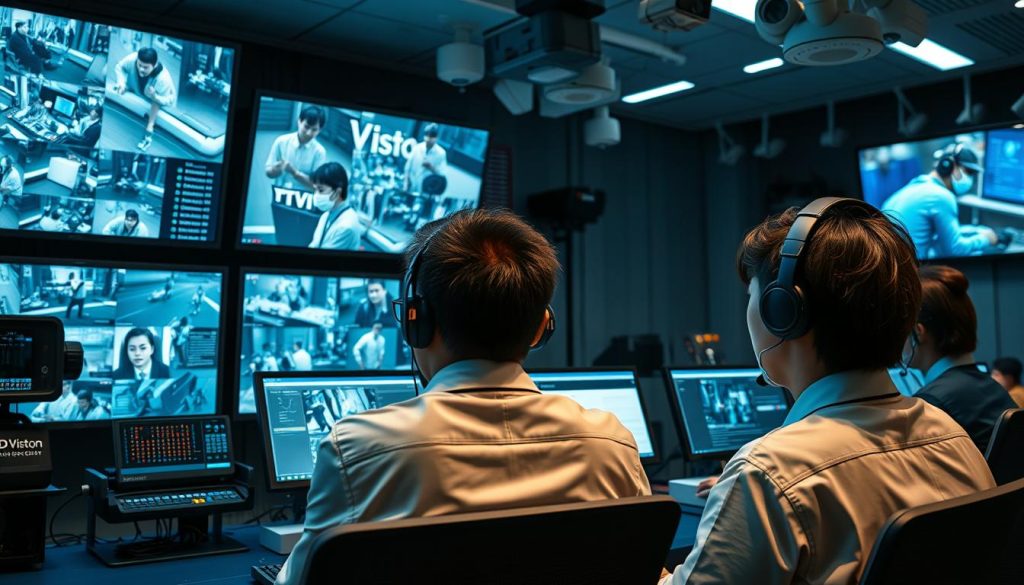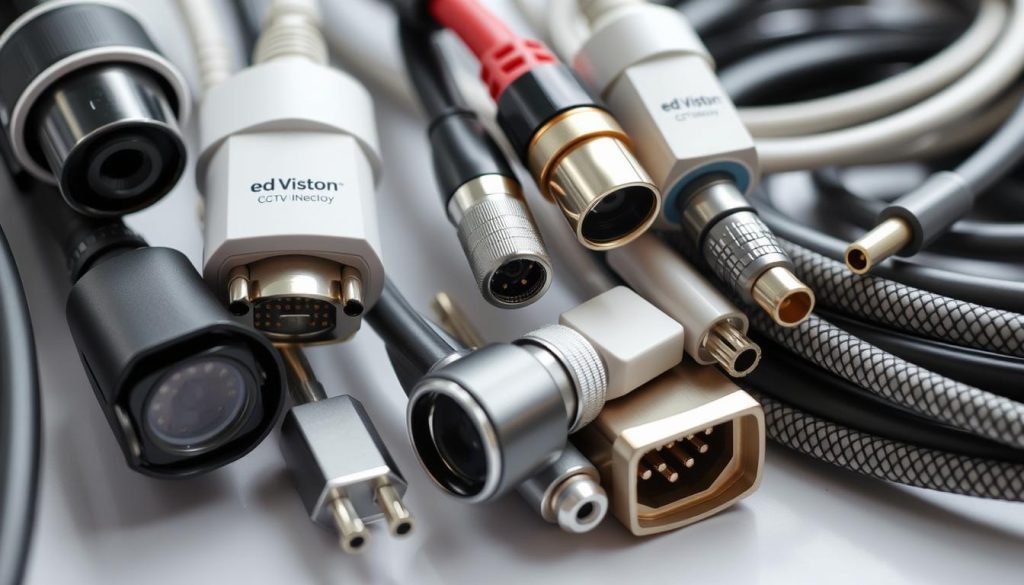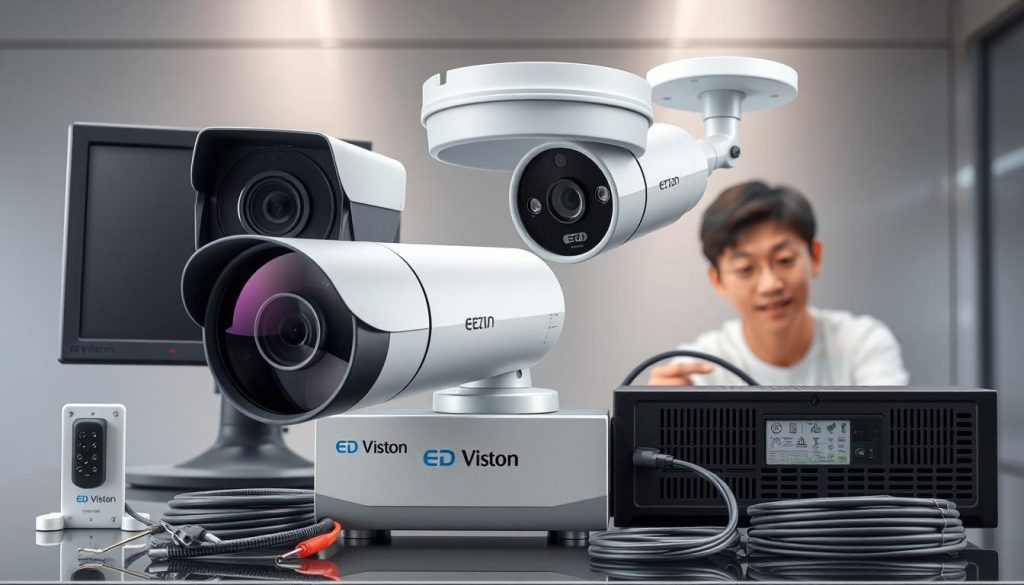Ever wondered what makes a security camera system effective? It’s all about understanding the 7 key components of CCTV. These components are vital for high-performance surveillance. In today’s world, choosing the right closed-circuit television components is key to your safety.
Video surveillance is always getting better. Knowing the essential CCTV parts is important for strong security in Singapore. This guide will help you understand each component and its role in CCTV systems.
Key Takeaways
- Understanding the 7 critical components of CCTV is essential for effective surveillance.
- Recognizing the differences between IP and analog cameras can impact your security setup.
- Camera configurations such as dome, bullet, and PTZ serve different surveillance needs.
- Video Recording Systems (DVR and NVR) are key for storing footage reliably.
- High-performance storage and data protection strategies are vital for maintaining video integrity.
- Power supply considerations play a significant role in the reliability of CCTV systems.
- Effective Video Management Software (VMS) enhances the management and oversight of your surveillance system.
If you’re interested in learning more about the latest CCTV solutions and offers, contact ED Viston today at +65 8313 4578!
Understanding CCTV Systems
CCTV systems use a network of technologies to watch and record what happens in a certain area. They send video signals from cameras to recording devices. This lets users see things live and review them later.
Looking into CCTV system essentials, we see how important video surveillance is. It’s used in homes, businesses, and public places. It helps prevent crime.
Each CCTV system has its own special features. Analog systems are known for being reliable and affordable. On the other hand, IP-based systems offer better video quality and extra features like motion detection.
To keep these systems working well, regular maintenance is key. This includes cleaning lenses, checking cables, and updating software. It’s important to do these tasks often.
Before setting up a system, it’s important to do a site survey. This helps figure out the best places for cameras. It also makes sure signals are sent clearly without any problems.
There are also many accessories and peripherals that can make CCTV systems better. Things like mounting brackets and IR illuminators help cover more area. Choosing the right monitor is also important. It should match the viewing distance and the quality of the image.
If you want to boost your security with CCTV, call ED Viston today at +65 8313 4578. They can tell you about the latest options and advancements.
What are the 7 components of CCTV?
Learning about CCTV systems can boost your security and surveillance. Each surveillance system has key parts, each with its own role. Knowing these helps pick the right gear for your needs.
Overview of CCTV Components
A modern CCTV system has seven main parts:
- Cameras: Capture video, with options in analog and digital.
- Monitoring Stations: Show and control live feeds from cameras.
- Video Recording Systems: DVRs and NVRs keep recorded footage safe.
- Supporting Accessories: Include cables, connectors, and tools for setup.
- Storage Solutions: Keep video data for a long time.
- Power Supply: Keeps the system running smoothly.
- Video Management Software: Makes footage easy to find and review.
These parts make up a full CCTV equipment list for top performance. For the best solutions, check out Wenhong’s IP CCTV offerings. They meet many needs.
Importance of Each Component
Each part is vital for a CCTV system’s success:
| Component | Function |
|---|---|
| Cameras | Capture high-definition video, making recording and monitoring easy. Modern cameras have night vision. |
| Monitoring Stations | Let users see live feeds and recorded video, controlling multiple cameras. |
| Video Recording Systems | Save video data well, with DVR and NVR for different needs. |
| Supporting Accessories | Make sure everything connects and works, with cables and connectors. |
| Storage Solutions | Keep recorded video with enough space for long-term access. |
| Power Supply | Stabilizes voltage, protecting against power issues. |
| Video Management Software | Makes finding and using footage easy, improving user experience. |
These surveillance system components work together for full security. They help in many places, like offices, homes, and public areas.
If you want to improve security with CCTV parts, knowing these parts is key. For the latest CCTV solutions and deals, call ED Viston at +65 8313 4578.
The Role of Cameras in CCTV
CCTV systems depend a lot on the cameras they use. Knowing the types of CCTV cameras is key. This includes IP cameras and analog security cameras. It helps choose the right surveillance for different places.
Types of Cameras: IP vs. Analog
In the CCTV world, you mainly see IP cameras and analog security cameras. Each has its own strengths for different security needs.
| Feature | IP Cameras | Analog Cameras |
|---|---|---|
| Connection | Wireless or Ethernet | Coaxial Cables |
| Image Quality | Higher Resolution | Lower Resolution |
| Installation | Flexible, often easier | More labor-intensive |
| Remote Access | Available via Internet | Limited to local access |
IP cameras give better resolution and remote access. On the other hand, analog security cameras are tough and good for old systems.
Camera Configurations: Dome, Bullet, and PTZ
The design of cameras is very important. There are a few main types:
- Dome Cameras: Small and great for inside.
- Bullet Cameras: Big and best for outside.
- PTZ Cameras: Can move and zoom for full view.
Each type has its own use. Dome cameras work well inside, while bullet cameras are strong outside. PTZ cameras are for places needing to zoom in and out.
Want to know more about CCTV? Call ED Viston at +65 8313 4578 today. They offer the latest solutions and can customize for you.
Monitoring Stations and Their Significance
Monitoring stations are key in CCTV systems. They are where operators watch and manage camera footage. The setup of these stations affects how well they work.
They can be simple for one person or complex for big control rooms. The right setup means better visibility and easier access.
Setting Up a Monitoring Station
Planning is key for a CCTV system’s success. Operators must think about the area’s layout and how many cameras there are. A good station lets them watch many feeds at once.
This helps them stay aware of what’s happening. With over 1 billion cameras worldwide, setting up stations well is more important than ever. It helps keep places safe and prevent crime.
Real-time Access and Flexibility
Today’s CCTV systems offer big benefits. Operators can watch feeds on mobiles and special software. This makes responding to incidents faster.
They can also use advanced features like AI video analytics. This cuts down on false alarms and improves analysis. It means professionals can tackle real threats with accurate information.

Invest in your security today. Contact ED Viston at +65 8313 4578 to explore the latest CCTV solution and offers tailored to your needs.
Video Recording Systems Explained
Video recording systems are key to CCTV’s success. Knowing the difference between DVRs and NVRs is important. Each has special features for different surveillance needs.
DVR vs. NVR: Key Differences
DVRs work with analog systems, using hard drives for video storage. They mainly connect with certain cameras. On the other hand, NVRs are for IP systems. They offer more flexibility and can work with many advanced components.
| Feature | Digital Video Recorders (DVR) | Network Video Recorders (NVR) |
|---|---|---|
| Type of Cameras | Analog | IP |
| Video Quality | Lower resolution | Higher resolution, HD support |
| Installation Complexity | Simpler | More complex but versatile |
| Storage Capacity | Limited by hard drives | Easily expandable through networks |
| Networking Ability | Limited | Extensive, connects to multiple devices |
Modern Integrative Solutions
New surveillance tech brings all-in-one solutions. These make monitoring and recording easier. They improve security management and adapt to your needs.
Choosing a good video recording system is vital for surveillance. For custom solutions, call ED Viston at +65 8313 4578. Discover the latest CCTV tech and special deals.
Supporting Accessories for CCTV Systems
Supporting accessories are key in a good CCTV system. They help all parts work together smoothly. Important cables like CCTV cables are vital for strong surveillance connections. The right cables make your system work better and stay reliable.
Essential Cables for Connectivity
CCTV cables, like RG59 Siamese coaxial cables, are top for shielding and connection. They carry both video and power, making setup easy and quick. Here’s a look at different cables for various uses:
| Type of Cable | Use Case | Advantages |
|---|---|---|
| RG59 Coaxial | Standard CCTV installations | High-quality video transmission, durable |
| RG6 Coaxial | Long-distance transmission | Lower attenuation, better for longer runs |
| Ethernet Cable (Cat5e/Cat6) | IP cameras | Supports power over Ethernet (PoE), versatile |
| Fiber Optic | Very long-distance needs | High-speed transmission, immune to interference |
Choosing the Right Router
For CCTV systems with wireless, picking the right router is critical. Look at compatibility, cost, range, and protocols. A good router boosts coverage and system performance. Here’s what to think about:
- Make sure the router works with your CCTV cameras for smooth operation.
- Choose quality within your budget to avoid connection problems.
- Check the range needed for your area to avoid coverage gaps.
- Go for routers with the latest wireless tech (like Wi-Fi 6) for better performance.

Call ED Viston today at +65 8313 4578 for the latest CCTV solutions. We offer custom solutions for your surveillance needs.
Storage Solutions for Video Data
Surveillance systems are getting more popular, leading to a big need for good storage. High-performance storage is key for smooth video recording and access. Regular storage can’t handle the huge amounts of video, so CCTV video storage solutions are vital.
Importance of High-Performance Storage
High-performance storage meets the special needs of video data. It offers fast write speeds, reliability, and lots of space. This tech lets users quickly get to surveillance footage, which is important for security.
A good storage solution makes CCTV systems work better and last longer. It keeps surveillance going without stops.
Data Protection Strategies
Keeping CCTV data safe is very important to stop unauthorized access and loss. There are several ways to make video surveillance data more secure. These include:
- Redundancy: Having multiple storage options means if one fails, others can be used.
- Backups: Regular backups to external drives or cloud services keep footage safe from loss.
- Encryption: Encrypting video files stops unauthorized viewing and keeps sensitive info safe.
Using these strategies helps keep surveillance footage safe and accessible. To learn more about CCTV video storage solutions, reach out.
Companies wanting to improve their security should use these strong storage and protection methods. For more on the latest CCTV solutions and offers, call ED Viston today at +65 8313 4578.
The Power Supply: A Critical Component
Proper power supply solutions are key to reliable CCTV systems. Organizing these power sources well boosts video surveillance performance. Methods like multi-camera boxes and individual transformers make power management easier. This ensures each camera gets the right energy for best performance.
Organizing Power Supply Solutions
Knowing the power needs is essential. First, figure out the total power needed by calculating the power per camera. For example, 20 cameras at 12V and 0.5A need at least 120 watts. There are several types of CCTV power supplies:
| Type | Description |
|---|---|
| Individual Plug-In Adapters | Make setting up single cameras easy, connecting directly to outlets. |
| Multi-Camera Power Supply Boxes | Power multiple cameras from one source, cutting down on cables and wiring. |
| Power over Ethernet (PoE) | Delivers both data and power through Ethernet cables, improving system reliability and setup ease. |
AC vs. DC Power Considerations
Choosing between AC and DC power is critical for CCTV systems. AC from the grid is usually converted to DC for camera use. A strong power supply helps avoid issues like image distortion or signal interference, which are vital for clear footage. Consider camera compatibility, equipment needs, and distance from the power source.
To make your surveillance setup a success, contact ED Viston at +65 8313 4578. Discover the latest CCTV solutions and offers to boost your security.
Video Management Software in CCTV
Video management software (VMS) is key in today’s CCTV systems. It helps manage video feeds from one place. This makes it easier to watch and analyze videos.
Benefits of Integrated VMS
Integrated VMS offers many advantages, mainly for those looking to improve their surveillance. It has several key features:
- Storage Functionality: It keeps video footage for later use, which is great for looking into incidents.
- Video Analytics: This lets users dive into video data, helping them understand security issues and respond faster.
- Easy Video Searches: It makes it simple to find and review videos from different systems, saving time.
- Unified Interface: It lets you control cameras from different brands all in one place, giving a full view.
- Operating System Integration: Some VMS works with other management software, making things even simpler.
- Proactive Alerts: Some systems send alerts about the health of your security setup, keeping everything running smoothly.
Compliance and Management Features
Meeting compliance and management standards is essential for good security. VMS helps with this by providing strong features:
- Scalability: VMS can handle lots of high-resolution cameras without getting slow.
- Cost-Effectiveness: Watching CCTV remotely can cut costs by up to 80% compared to on-site guards.
- Advanced Imaging: High-resolution cameras and Ultra HD give clear video, while PTZ cameras focus on specific spots.
- Detection Capabilities: Video analytics can tell the difference between people and animals, reducing false alarms.
- Audio Intervention: Using audio responses with remote security can be cheaper than hiring guards.
For more on how VMS can boost your CCTV system, contact ED Viston at +65 8313 4578. Learn about the latest CCTV tech and special deals for your security needs.
Conclusion
In this article, we looked at the key parts of CCTV systems important for today’s security. High-definition cameras capture clear images, even in dim light. We also talked about the differences between old analog systems and new IP-based ones.
Each part is vital for a system’s success. Knowing how CCTV works helps protect places and lets people act fast when something happens.
When picking out surveillance, think about all the parts you need. You might want dome, bullet, or PTZ cameras for different places. New tech like AI is also making CCTV systems better.
If you’re curious about the newest CCTV options and deals in Singapore, contact ED Viston today at +65 8313 4578. Your safety is worth it!
FAQ
What are the essential components of a CCTV system?
How do IP cameras differ from analog cameras?
What types of CCTV cameras are available?
Why is a monitoring station important?
What are DVRs and NVRs, and how do they differ?
What role do cables play in a CCTV system?
How important is storage in a CCTV setup?
What factors should I consider when selecting a power supply for a CCTV system?
How does video management software enhance a CCTV system?
Source Links
- https://www.bcdvideo.com/blog/components-of-cctv-security-systems/
- https://edgebusinesssecuritycameras.com/the-different-parts-of-a-cctv-system
- https://security360.pk/components-of-cctv-camera/?srsltid=AfmBOorfTd7XxQ6VUQAY_ew6TSidVtYOh2Cd63oFEKlE62aQDHh-pHJ4
- https://kigalismartsolutions.com/7-essential-components-of-cctv-camera/
- https://security360.pk/components-of-cctv-camera/?srsltid=AfmBOorwkJQnEoJfmrhx2PH0Cj1Fp-RX0ZREQQX0H_rR1YPaQbMk59RJ
- https://www.gensecurity.com/blog/understanding-cctv-components-the-4-parts-every-system-requires
- https://security360.pk/components-of-cctv-camera/?srsltid=AfmBOopgwKieFa0Mji_0LvlFvrJbnpDf8ua4_-wowH52G2hbrhla9rKF
- https://www.cctvsecuritypros.com/articles/what-is-cctv-and-how-does-it-work/?srsltid=AfmBOooJCOQMRgbcpZqcnJYEcnOa066udmmREnwlHDDAzYY5wso_cYT5
- https://security360.pk/components-of-cctv-camera/?srsltid=AfmBOortUbqibKuG01qA-r-kzhPizwrCmU0LUFgQjyvxAlIgGX-UX4_c
- https://cctvcamera.com.sg/how-cctv-camera-work/
- https://sirixmonitoring.com/blog/what-is-cctv-monitoring-and-how-does-it-work/
- https://safeguardsystems.co.uk/cctv-monitoring/cctv-monitoring-10-terms-need-to-know/
- https://security360.pk/components-of-cctv-camera/?srsltid=AfmBOorRyc4sg1cnb8SsWMeanUYS_pd28JaxQ1v0AG4HsZnMeF74zTcr
- https://security360.pk/components-of-cctv-camera/?srsltid=AfmBOopze7F66eV-7_FJ8YFRlkLtFCi0cDcbf7OcQIRS45DXPBdYF1rZ
- https://en.wikipedia.org/wiki/Closed-circuit_television
- https://security360.pk/components-of-cctv-camera/?srsltid=AfmBOorDYTA1eFl095GA3X2dpF7lB7lYY4_9Eb6at8KjjY2DrvSI8voR
- https://globizs.com/know-the-cctv-components-the-parts-every-system-requires/
- https://www.dhs.gov/sites/default/files/publications/CCTV-Tech-HBK_0713-508.pdf
- https://www.paessler.com/it-explained/cctv
- https://senstar.com/senstarpedia/what-is-a-video-surveillance-system/
- https://bas-ip.com/articles/cctv-power-supply/
- https://security360.pk/components-of-cctv-camera/?srsltid=AfmBOorv_wg2qGdKODk6T-P1_o99YnLcKYW4hndZhKfORiOXJxCRvYh9
- https://mammothsecurity.com/blog/what-is-video-management-system
- https://safeguardsystems.co.uk/cctv-monitoring/cctv-monitoring-system-components/
- https://www.cctvsecuritypros.com/articles/what-is-cctv-and-how-does-it-work/?srsltid=AfmBOorGOCBxhIxQwL5RIOAAdJTmaYg-qLhF8XEjrxnYtYJMl7RPLYhi
- https://www.aisecurity.pk/components-of-cctv-camera

